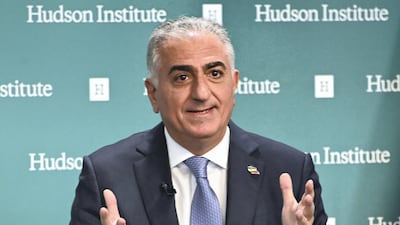As the Iranian leadership encourages the nation to vote in the forthcoming presidential elections as a "religious duty", in a rare show of unity, Iran's opposition forces launched a new social media campaign that asks the public to stay away from the polls and seeks the replacement of the fundamentalist regime with a secular government.
The Farsi language hashtag Na be joumhoriye Islami, (No to the Islamic Republic), has so far attracted the support and endorsement of thousands of Iranians in and outside the country, with the number increasing by the day.

Hundreds of renowned exiled Iranian actors and film directors, world champion athletes, writers and academics posted their pictures and video clips on social media in support of the protest by holding a placard that bears the logo of the campaign.
The movement received a boost this week when Prince Reza Pahlavi, the son of former shah of Iran and an opposition figurehead for large sections of Iranian diaspora, added his support.
"The 'No To the Islamic Republic' campaign sprung up from Iran and is growing," Reza Pahlavi said.
"The strength of the campaign is that it does not belong to any political faction, party, or individual alone. With the unity and cohesion being established in this campaign, freeing ourselves from this dark chapter in our history and arriving at a bright future, is possible.
"This campaign reflects the most fundamental desire of the Iranian people: freedom. Our nation is saying with one voice that they do not accept the Islamic republic.
“We believe the free world has a moral responsibility to heed this. Signing short-sighted deals with the Islamic regime will not solve any of their security concerns; it will only serve as a temporary bandage.
"Sustainable security and productive relations lies not in appeasing a dying regime, but in embracing and engaging the rising secular democratic opposition.
"The recent developments in the Middle East, especially the historic Abraham Accord, can be built upon and become truly historic when a free Iran is part of the solution as well."
Iranian public becoming apathetic to elections
The campaign's objective of calling for the boycott of the June presidential election is deliberately chosen, because the Iranian regime has traditionally associated high election turnouts as "proof of legitimacy and popularity" for itself.
However, senior Iranian politicians expressed their concern that the failure of President Hassan Rouhani to solveIran's economic problems, caused by rampant corruption and sanctions, as well as the full control of the clerical institutes over the election process, has led to public apathy to take part in further elections.
"If the conservative Guardian Council that oversees the selection of presidential candidates continues to use its filtering power, then we will end up with the same mess in our country as before, no matter who becomes our next president," Mohammad Ashrafi, a reformist politician, told Borna news agency.
Less than 20 per cent of eligible voters participated in the February 2020 parliamentary elections in Iran.
"Going by the figures, our people are clearly saying that they will not vote in any more elections, and this is a very dangerous issue for the Islamic republic", Ashrafi said.
The June presidential elections in Iran are significant for the regime and its opponents, because the country's ideological army, the Islamic Revolutionary Guard Corps, for long the de facto rulers of the country, are now openly vying to take over the presidency, against the constitution and the strict ban by Ayatollah Ruhollah Khomeini, founder of the republic.
Several former commanders have begun their electioneering campaigns, presenting themselves as academic, economist and even reformist who can end the country's numerous social and economic woes.
Three reasons why IRGC wants to win the presidential election
Hassan Shariatmadari, a member of the opposition group Council for Transfer of Power in Iran, believes the decision for the IRGC to enter and win the presidential election at any cost is based on three main reasons.
"First and foremost they want to conquer this last bastion to consolidate their full control of the country's sources of revenue," Mr Shariatmadari said.
“The Guards are also worried that a possible deal between Washington and Tehran will involve the curtailing of their power at home and in the region.
"And, most importantly, they are strengthening their grip on power for a post-[Ali] Khamenei era.”

